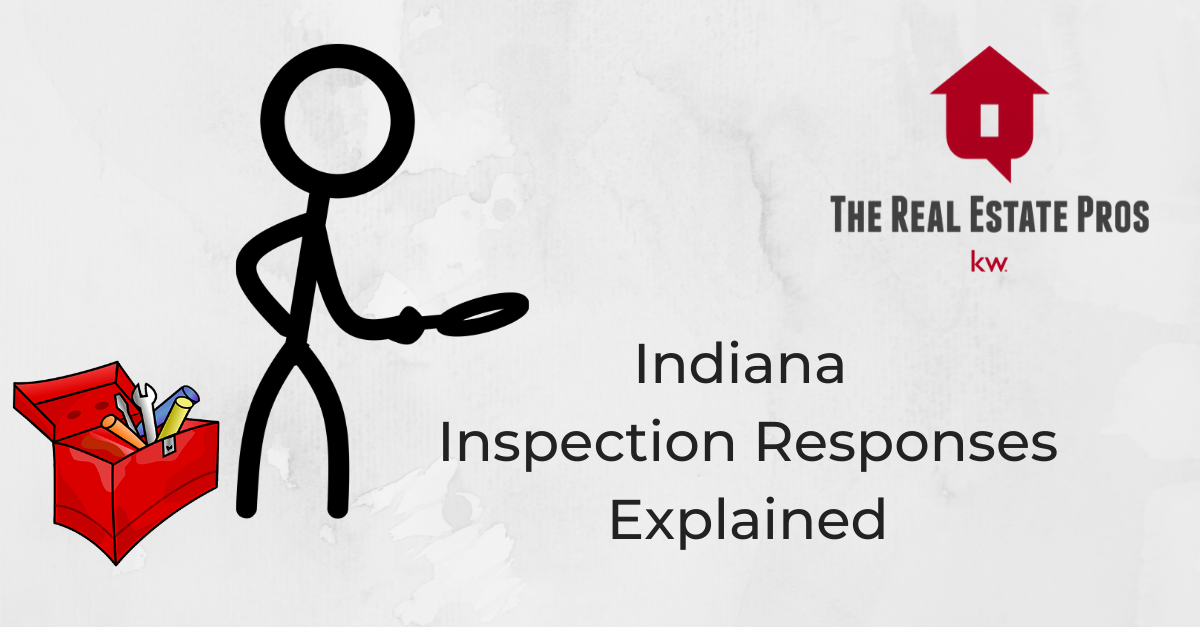
Indiana Inspection Responses Explained
Understanding Inspection Responses
The inspection responses process is one of the steps in purchasing and selling a home in Indiana. It can be quite confusing if you don’t have a professional to help explain all the ins and outs. We wanted to hit the high points for you so you have a better understanding of the entire process.
Inspection Responses for BUYERS & SELLERS
For buyers, the process can be a bit unnerving. You’ve found your dream home and then it’s time to inspect all the items you can’t see. Your anxious, nervous and don’t want to feel like you are being taken advantage of by a seller.
First of all, take a deep breath! Know this: NO home is perfect… ever! Not even a newly built home, which is why you still have an opportunity to walk through it and tell the builder what still needs to be done and point out imperfections.
We suggest the following types of inspections to our buyers:
- Whole House Inspection
- Pest Inspection
- If applicable, a well water test
- If a government backed loan (FHA, VA, USDA, etc..) and the property has a well and septic, the lender will typically also want a drawing showing that the well and septic tank are at least 50 ft apart and 100 feet from the drain fields. Check with your lender for specifics to your purchase.
You, of course, have final say as to the type of inspections you want.
The Inspection Report
It is not unusual to have an inspection report that is 50+ pages long. Don’t freak out as the seller or the buyer.
The job of the inspector is to point out every little thing including defects, maintenance and safety items. The report is for that snapshot of time – that day. The report does not deal with anything prior or in the future – just the condition of the home on the day and appointment time of the inspection.
Buyers:
The Inspection Report is NOT a repair list for the sellers. You are looking for defects as defined by the state of Indiana:
“…a condition that would have a significant adverse effect on the value of the property, that would significantly impair the health or safety of future occupants of the property or that if not repaired, removed or replaced, would significantly shorten or adversely affect the expected normal life of the premises.”
Keep in mind, that if a defect has been disclosed on the state form “Real Estate Seller’s Disclosure, it cannot be the basis for termination of the Purchase Agreement. Basically, this is because you were made aware of it through the Seller’s Disclosure but still wrote an offer that was accepted.
 What are Buyer’s Looking For in the Inspection Report?
What are Buyer’s Looking For in the Inspection Report?
Ultimately, you are looking for one of three things in the report:
1. Structural/Foundation defects:
roof
basement, crawl space, slab foundation defects like floor joists & main beams
water intrusion, etc…
2. Safety Hazards such as:
electrical issues
GFCI outlets near water sources
safety issues (i.e. such as non functioning windows or doors or locks)
natural/propane gas leaks
high radon readings, etc…
3. Active defects such as:
leaks in the plumbing
active insect/pests like carpenter ants, termites, etc…
major components not functioning properly (i.e. HVAC, water heater, etc…)
While this is not an all-inclusive list, you get the idea. Things like the following are NOT considered defects and should not be included in your inspection responses:
- Any cosmetic issues such as the color of the walls, appliances, carpet…
- Picture hanging nail holes
- Cabinet hardware
- Existing homes do not have to be brought up to current code, they are grandfathered in. Most codes today are for newly built homes or remodeling that require sign-off by a building inspector
Remember, too, just because something is older, does not mean it should be replaced. If a furnace is older but functioning just fine, you can’t ask for it to be replaced simply due to the age.
Your inspector is paid to point everything out, that doesn’t mean you can ask for everything.
What should sellers do when they receive Inspection Responses?
Again, take a deep breath and try to relax. It can seem overwhelming but it happens everyday in the real estate world. And, remember not take it personally – this is part of a real estate business transaction.
The smartest thing to do is to call qualified professionals to get you a quote for the item repairs asked for in the inspection response. This way, you know what type of money all the repairs will cost and can make an educated and knowledgeable response to the buyers.
We have found that lots of times the repairs don’t cost as much as the seller is expecting them to or sellers can know negotiate what they are willing to do knowing what it will cost.
Work with your Agent
Your agent will work with you to prepare the Buyer’s Inspection Response or Seller’s Inspection Response. We are your guide and can help you understand the reports and what to ask for or what you should fix.
Repair Allowance
Sometimes, a buyer or seller asks for/offers an allowance made out a contractor of the buyers choice instead of the seller having the repairs done. This is nice in a lot of ways!
The buyer can use contractors they know to complete the repairs after they own the home. The sellers have the checks made out by the title company out of their proceeds from the sale. It’s a win-win for lots of clients!
Seller has Repairs Completed Prior to Closing
If a seller does contract to get the repairs made, they will need receipts from the contractors they used as proof and as a warranty for the work. These are sent to the Buyer’s Agent for inclusion in the file for the buyers.
A buyer should have a re-inspection once repairs are complete, as well. This will ensure all the repairs called out were made.
Things to Remember about Inspection Responses
- No home is perfect. Buyers need to keep this in mind when reading the report and sellers need not take any repair requests personally.
- According to the IAR Purchase Agreement, buyers have to give the seller the opportunity to remedy defects. This means you can’t simply walk away after receiving a report.
- Working with an agent through this process is the best way to hold the transaction together.
- When there are Closing Delays, a larger percentage of them are due to inspection responses. Understanding the process and how it works for both sides of the transaction means you’re more likely to stay on track for your original closing date.

